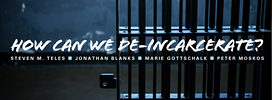Lead Essay
Steven M. Teles surveys the recent history of criminal justice politics in the United States. He finds it hard to deny that advocates of reform have suffered a reversal: The law-and-order message of Donald Trump’s candidacy seems like it may bring Republicans back to where they were two decades ago on criminal justice policy. But without conservative political support, the legislative process in the states will not yield significant de-incarceration. The large majority of the incarcerated are under the authority of the states, and the Republican Party has some share in the government of many of them. Teles sketches some possible ways forward for reform, but all of them involve continued conservative activism on this issue.
Response Essays
Peter Moskos surveys a rapidly shifting political landscape: With Donald Trump as the president-elect, all bets are off. The reform of our incarceration system seems further away than ever. Reducing incarceration will certainly require both ending the war on drugs and greatly reducing sentence length for all types of crime. Neither seems politically possible now. And perverse incentives will continue to keep sentences long even for relatively minor crimes: Local officials do not pay for the incarceration of those whom they give longer sentences. For these, the costs are passed along to the state governments.
Jonathan Blanks looks beyond partisan politics, to a culture that sees incarceration as the solution for too many problems. Neither party has done much to address this stubborn feature of our political life. Blanks sees the failure of mens rea reform as illustrative of the difficulty: Neither side could be counted on to take the de-incarcerating view when it really mattered. The left has likewise been all too willing to deploy harsh sentencing at times when its other political goals seem to demand it. But both of these are only a small matters, in context, because significant reductions in our prison population will require shorter sentences in general, and for all violent offenders.
Marie Gottschalk doubts that Republicans were ever serious about doing the hard work that de-incarceration would require. She notes that the project’s fiscal benefits would likely be modest, and that even framing the issue as just one of saving money tends to obscure the real work of building crime-free communities and curbing institutional racism. Successful de-incarceration will require more money, not less, she argues, to help with the educational, health, and re-adjustment needs of former prisoners. These questions of social justice can’t easily be addressed when conservatives’ chief interests lie with saving money alone.
The Conversation
Coming Up
Essays by Marie Gottschalk, Jonathan Blanks, and Peter Moskos. Conversation to continue through the end of the month.
Related at Cato
Podcast: “Is Criminal Justice Reform Really Dead?” with Marc Levin, November 1, 2016
Upcoming conference: The State of American Criminal Justice, December 7, 2016
Cato Institute public filings on U.S. criminal justice cases
PoliceMisconduct.net, a project of the Cato Institute

